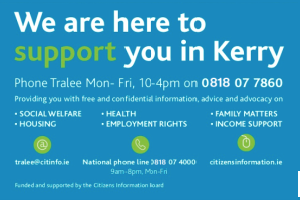 A WOMAN in Tralee had a substantial amount of money taken from her account after being targeted by fraudsters last week.
A WOMAN in Tralee had a substantial amount of money taken from her account after being targeted by fraudsters last week.
The victim received a text message from someone purporting to be her bank on November 12, telling her to update her personal details.
She logged in through the link on the message and was told to update her PIN number. She tried to do so and was told she was logged out.
Continued below…
A short time later, she was contacted by her bank asking her did she make a large transaction of money to a foreign account. The fraudsters had transferred a large amount of money
Tralee Gardaí are advising the public that their bank will never text you or call you asking for personal details or PIN number.
Today, An Garda Siochana and FraudSMART issued information to alert the public to an ongoing Frauds enabled via Text messages, Fake Loans websites, Advance Fee Fraud and Invoice Re-direct Fraud.
It is particularly important that the public are alerted to potential frauds as we enter the Christmas period.
Consumers urged to be extremely cautious around Text and Online Loan scams which are on the rise before Christmas.
Detective Chief Superintendent Patrick Lordan of the Garda National Economic Crime Bureau (GNECB) this morning said that Gardaí were concerned at the growing number of new scams that are arising and the particular targeting of consumers as Christmas approaches.
An Garda Síochána at GNECB and BPFI are advising consumers to be on the alert to text message, email or telephone call scams in which victims receive a text/email or call appearing to be from their bank asking them to for PERSONAL DETAILS or SECURITY INFORMATION designed to get unlawful access to bank accounts.
The text, email or telephone call will instruct the individual to go to a website or make a phone call to a specified number, after which personal information will be sought. To prompt urgent action by the victim the fraudster will create a fear that if the customer does not take immediate action their account will be compromised.
What to do: If a member of the public receives UNSOLICITED text messages, emails or telephone calls from their bank looking for this information, they must contact their bank and check the validity of the request and the security of the funds in their account.
Do not use links received in the text or email to contact the bank and do not use telephone numbers supplied. Look up the number of the bank independently and contact them if there are any concerns.
Online Loans SCAM
An Garda Siochana, BPFI and the Central Bank of Ireland wish to alert the Public to websites unlawfully offering loans online to the public in an Advance Fee Fraud.
As we enter the Christmas period many people will be under financial pressure. These unlawful websites will be looking to take advantage of financially vulnerable people.
The websites offer loans online. Within minutes of making an online application for a loan, the applicant will be immediately contacted and will be informed that their loan application is successful.
They will then be asked to pay a fee in advance of the loan being issued. This is a ‘Scam’, no loan will be issued and the customer loses the fee they have paid in advance.
What to do: Check the register of authorised firms on the Central Bank of Ireland (Central Bank) website to determine if the website/company is registered as a Retail Credit Firm or Money Lender.
The register of authorised firms can be accessed at http://registers.centralbank.ie/. If the website/company that is offering loans is not listed, DO NOT apply for a loan on that website or to that company.
You can report the matter to the Central Bank: details contained at https://www.centralbank.ie/regulation/how-we-regulate/authorisation/unauthorised-firms
Online Fraud
Advance Fee Fraud / Theft
Gardaí wish to advise the public to be wary about online purchases or sales in the Christmas period, particularly when the product is considerably under market value or is being offered for sale via an unsolicited email, text or phone call.
BUYING a product – The public must be wary of a product being offered for sale under the market value, by persons unknown who are seeking payment in advance. In many cases there will be photographs of the product which have been taken from other legitimate websites, the product will be offered for sale and payment will be sought in advance and the product will not be delivered.
Selling a product – If selling a product, ensure the purchaser is genuine before transporting the product prior to payment. The fraudster will frequently send an email or text purporting to be from a bank or a payment service such as Paypal confirming that the payment has been made, such communications will often be fake. The fake communication is designed to prompt the seller to dispatch the product before the payment actually hits their account.
If in doubt do not complete the purchase or the sale. Check with your bank or with the Payment Service to confirm the payment is correct.
What to do: Use online retailers with good reputations such as high street shops or established online stores. Check out the information on the site to ensure it is genuine. Use the same credit card for all online purchases: easy to cancel if something goes wrong! If the deal sounds like it is too good to be true it probably is!!
Invoice RE-Direct Fraud
Invoice Re-Direct Fraud is a method of targeting a company by creating a fake invoice or identifying a genuine invoice in the name of a supplier with whom the target company is doing business. The invoice is sent to the target company asking for the payment for the product or service to be paid into an account controlled by the fraudster. This is causing considerable losses to business throughout the country.
What to do: If a supplier asks for payment to a new account, a red flag should be raised. Contact the supplier by telephone to check if the requested change of account is correct. Do reply to an email or use the contact information supplied in the email Check all emails carefully, to ensure it is coming from a genuine source. Make all relevant employees aware of this Fraud type.
Fake email example: patrickjoreilly@gmail.ie patrickjoreil!y@gmail.ie
Gardaí at the Garda National Economic Crime Bureau (GNECB) wish to advise that the focus of the criminals in this latest scam is to obtain personal information that will allow them to steal money from bank accounts. Detective Chief Superintendent Patrick Lordan, GNECB stated that ‘banks and other financial entities will never make unsolicited contact with individuals asking for personal details, account numbers, 4-digit pin number or passwords.” He warned ‘that people receiving unsolicited communications looking for these personal details should not reply to text messages, emails or other communications. They should contact their bank independently to check on the validity of the communications they have received before taking any action’.
Niamh Davenport, who leads the BPFI FraudSMART programme, offers the following advice to consumers: “Always be wary of any unexpected calls or texts which appear to be your bank especially those asking for personal details or payments. Your bank will never ask for your personal information so never give your financial or personal information in order to release money, refund fees, or access to your computer. Fraudsters are very convincing but don’t be afraid to take the time to make the relevant checks. The scammer will try to rush you, but this is all designed to panic you into doing something you wouldn’t otherwise do.”













